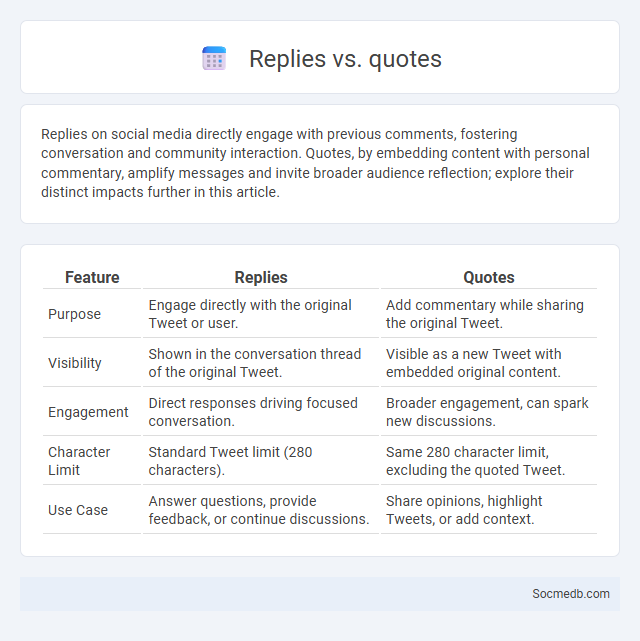
Photo illustration: Replies vs quotes
Replies on social media directly engage with previous comments, fostering conversation and community interaction. Quotes, by embedding content with personal commentary, amplify messages and invite broader audience reflection; explore their distinct impacts further in this article.
Table of Comparison
| Feature | Replies | Quotes |
|---|---|---|
| Purpose | Engage directly with the original Tweet or user. | Add commentary while sharing the original Tweet. |
| Visibility | Shown in the conversation thread of the original Tweet. | Visible as a new Tweet with embedded original content. |
| Engagement | Direct responses driving focused conversation. | Broader engagement, can spark new discussions. |
| Character Limit | Standard Tweet limit (280 characters). | Same 280 character limit, excluding the quoted Tweet. |
| Use Case | Answer questions, provide feedback, or continue discussions. | Share opinions, highlight Tweets, or add context. |
Understanding Replies, Quotes, and Reports
Understanding replies, quotes, and reports on social media allows you to engage more effectively with your audience by interpreting different types of interactions. Replies offer direct communication and feedback, while quotes provide context by sharing original content along with your added perspective. Reports help maintain community standards by flagging inappropriate content, ensuring a safer and more respectful online environment.
Key Differences Between Replies, Quotes, and Reports
Replies directly respond to a specific post, fostering conversation by addressing the original content or user. Quotes allow you to share someone else's content while adding your own commentary, enhancing context and engagement through personalized input. Reports are used to flag inappropriate or harmful content, ensuring platform safety and adherence to community guidelines.
When to Use Replies in Online Discussions
Using replies in online discussions helps maintain clarity and organization by directly addressing specific comments or questions. You enhance engagement by replying promptly and relevantly, fostering meaningful conversations within social media platforms. Ensure your reply adds value to the thread or resolves a query to maximize its impact on Your online presence.
Effective Use of Quotes for Context
Effective use of quotes in social media posts enhances engagement by adding authenticity and emotional impact. Incorporating relevant, concise quotes from authoritative sources or industry leaders boosts credibility and helps convey messages more powerfully. Strategic placement of quotes within visuals or captions maximizes resonance with target audiences and encourages sharing.
The Role of Reports in Community Moderation
Reports play a crucial role in community moderation by enabling users to flag inappropriate content, ensuring faster identification and removal of harmful posts. Effective reporting mechanisms help maintain platform safety by empowering moderators to prioritize cases based on severity and user feedback. Leveraging data from reports enhances automated moderation tools, improving overall community health and user experience.
Benefits and Drawbacks of Replies
Replies on social media foster engaging conversations by allowing users to directly respond, which enhances community building and increases content visibility through algorithmic prioritization. However, they can also lead to misunderstandings or escalated conflicts due to the lack of tone and context, potentially impacting user experience negatively. Effective moderation and clear communication strategies are essential to maximize the benefits and minimize the drawbacks of social media replies.
How Quotes Enhance Clarity and Engagement
Quotes enhance clarity and engagement by distilling complex ideas into concise, memorable phrases that resonate with your audience. They provide authoritative support and emotional connection, making your social media content more impactful and shareable. Using relevant quotes strategically boosts your message's credibility and encourages higher interaction rates across platforms.
Proper Etiquette for Reporting Content
Proper etiquette for reporting content on social media involves providing clear, specific details about the violation to facilitate efficient review by moderators. Users should avoid misuse of reporting tools by only flagging content that genuinely breaches platform guidelines, ensuring respect for community standards. Maintaining a respectful tone when interacting with support teams enhances the likelihood of a timely, fair resolution.
Common Misconceptions About Replies, Quotes, and Reports
Many users mistakenly believe that replies on social media are always public, but some platforms allow private or limited visibility responses. Quotes are often confused with direct reposts; however, quotes enable adding personal commentary to shared content, enriching discussions. Reports are frequently misunderstood as immediate content removal tools, though they typically trigger a review process to determine policy violations before any action.
Best Practices for Healthy Online Communication
Maintaining respectful language and active listening are essential best practices for healthy online communication on social media. You should avoid sharing misinformation by verifying sources and promoting positive interactions that foster understanding and empathy. Managing your digital boundaries by limiting screen time and engaging in meaningful conversations helps protect your mental well-being while building genuine connections.
 socmedb.com
socmedb.com